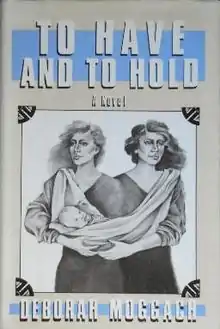To Have and to Hold (Moggach novel)
To Have and To Hold, is a novel by English author Deborah Moggach, first published in 1986 by Viking. The novel started as the script for an eight-part television drama for London Weekend Television, screened in September 1986.[1]
 First US edition | |
| Author | Deborah Moggach |
|---|---|
| Country | United Kingdom |
| Language | English |
| Publisher | Viking (UK) E.P. Dutton (US) |
Publication date | 1986 |
| Media type | |
| Pages | 320 |
| ISBN | 0-670-80812-1 |
Plot introduction
Liberated Viv, happily married to Ollie, decides to bear a surrogate baby for her sterile sister Ann, but instead of artificial insemination conceives naturally with her brother-in-law Ken, who falls in love with her.
Reception
- According to Nicholas Shakespeare in The Times, "A very good novel indeed - contemporary in its subject, compassionate in its treatment of the four central characters, and intelligent in its pursuit of the many hares they start." but goes on to write "While going a bundle on images of fecundity, Moggach does have an instinctive eye for the tell-tale gestures people use to hurt or avoid each other. Nevertheless, there is a sense she only realises half way through quite what she is taking on."[2]
- Its origins as a television script are exposed by Jill Neville writing in The Sunday Times, "A VERY 'hot' subject like surrogate motherhood seems suspiciously commercial for a novel of quality. And each scene in Deborah Moggach's To Have and To Hold is written, frame by frame, as if set up for a TV camera, starring the Stringalongs, circa 1985.' but she goes on to write 'Despite the journalistic breeziness of her style, Moggach paces her sexual minuet with craft and conveys the authentic hot rush of maternal passion."[3]
Television drama
- Viv - Amanda Redman
- Ann - Marion Bailey
- Ollie - Brian Protheroe
- Ken - Eamon Boland
References
- https://www.imdb.com/title/tt0397015/
- 'Books: Passion, worldliness and lingering scents' by Nicholas Shakespeare; Review of recent fiction Source: The Times (London, England). (Apr. 10, 1986)
- Books: Manipulators and moralisers; Reviews of new fiction Source: Sunday Times (London, England). (May 4, 1986)
This article is issued from Wikipedia. The text is licensed under Creative Commons - Attribution - Sharealike. Additional terms may apply for the media files.